- Home
- Michelle Hodkin
The Becoming of Noah Shaw Page 6
The Becoming of Noah Shaw Read online
Page 6
But she did.
Those suicides weren’t the first I’ve witnessed. I’ve thought about my own, to the point where as a child the Peter Pan quote “To die will be an awfully big adventure,” felt like a taunt. But there had been others, other Carriers, other Gifted. A Swedish girl who slit her wrists in the bath. A boy in America who left the car running in his parents’ garage. There had been only the two, and they were like and not like me—they did want to die, and they could die. I felt what they felt, but also an urge not just to help them, but to join them. Sometimes, particularly when this was all new, it felt like I was joining them. Like connections were forming, new nerves were firing, drop cloths were being pulled from dusty furniture.
Confession: What I understand that They—most everyone, really—don’t, is that suicide isn’t an act of selfishness. Sometimes the hurt/pain/shame/loss is so much, so constant, and with no guarantee that it’ll ever dissolve, sometimes the cost/benefit analysis of life/death truly feels like it’ll only ever work out in in favour of death. I never knew the names of the boy and girl who killed themselves before, but I felt what they felt as they died. It was like—imagine the best moments of your life. Then try to subtract them. Subtract every ounce of joy you’ve ever experienced. Erase every happy memory you’ve ever had.
I couldn’t hear what they’d been thinking as their lives drained from their bodies, but I could feel their relief. They didn’t want to hold on. They were happy to let go.
But not Beth. Not Sam.
This is what people who have never wanted to die don’t understand: the worst thing for those of us who do is feeling like we have to live when we don’t want to. We have to do things we don’t want to. We have to be where we don’t want to be. What we want is nothingness, numbness, because that seems better than living a life of quiet desperation. Quiet desperation is torture.
Others pretend at happiness for the world while they struggle alone in the dark, gushing with friends and wives and children whilst knowing the world is broken, that it can never be fixed. They know it and can’t unknow it—they can’t let go either. They want to, though, more often than not.
But Beth does not—did not—feel that way. She didn’t think that way. I feel her feelings still, as the underground spits us up into the semidarkness of the East Village, each of us rippling with the impact of her death in our own way.
Mara’s hand is in my hair as I lean my head back against the cracked leather seat of the cab we eventually decided to take. I try and reach for memories of Sam, because I feel a pattern forming, the design of something I don’t have the vision to understand, but Mara’s presence is distracting.
She wants to talk about what happened and I . . . don’t. Because talking about them means talking about myself and how they’re different from what I am. How they weren’t missing what I’m missing. They weren’t hollow. They didn’t exist because they had no other choice. They hadn’t grown up as I had, acting careless and reckless because on some level I felt I had nothing to lose. They didn’t see the world through a lens in which every scene contains a door marked exit, a door I’m unable to open.
They lived because they wanted to. Up until the end, when they were poisoned by a . . . nothingness.
But where did the poison come from?
Where did the address come from?
Mara will want to know what I know, and I’ll have to find a way to tell her about Beth and Sam without telling her I wanted to save them and follow them at the same time.
And then there are those words.
Don’t let her death be in vain.
Those were the words the professor had written to my father, words my father left to me—the words were meant for me. Before I was even born I was saddled with a burden I never asked for, never would’ve wanted, and don’t know what to do with now that I’ve got it.
These are the thoughts that sizzle and smoke until my mind is coated in a stale layer of misery. I hadn’t even noticed that Mara had taken me to the hotel, up to our room. She doesn’t turn on the light—the curtains are open, only the gauzy layer beneath is drawn, and the moon shines through them, outlining her hands, her arms, as she pulls off my shirt, hers, then both of us into bed. My eyes are wide open, staring at dark. She’s a soft curve behind me, hooking her arm under mine, her hand on my chest, her head curled against my shoulder.
“Something’s wrong.”
“Yes.”
“Are you okay?”
My voice is scraped out. “Are you okay?”
“You’re hurt.” I hear the shadow of something growing in her mind.
“I’ll heal.”
She lets out a breath, but tightens around me. “That’s not what I’m talking about.”
“I always do,” I say flatly, ignoring her.
She’s silent, all of her. I can’t even hear her heartbeat. Something’s wrong indeed.
I turn to face her, her eyes blurred with sleep and sadness. I cup her cheek, kiss her forehead.
“I love you,” she says.
I remember Jamie’s words and smile just a bit as I tuck her head beneath my chin. “That is your misfortune.”
In truth, though, it’s mine.
13
CASTLES IN THE AIR
THE ADDRESS VANISHES THE MORNING after. If Mara’d seen it, she’d have mentioned it, but she doesn’t, and the moment when I should have is long past. Another confession: I don’t want to talk to her.
From the first, Mara was curious about my ability, as was I about hers. She wanted to experiment, to test each other, which is well and good if one experiments killing/healing nonsentient creatures, in theory if not in practice. (A badly executed excursion to the Miami Zoo comes to mind—I’d thought Mara’s belief about her ability was a manifestation of her survivor’s guilt. She proved me very, very wrong.)
But when she first understood what comes along with my particular affliction—seeing others like us when they’re in pain—her first thought, quite literally, was to hurt herself to see if I’d then have a vision of her, through her eyes, and feel what she felt.
She’d only pinched her arm then, but when I asked her why all those months ago—
“When you first told me you saw me, in December, in the asylum—you said you saw what I was seeing, through my eyes,” she had said. “And when Joseph was drugged, you saw him through someone else’s eyes—the person who drugged him, right?”
She was right. She was right because she caused the asylum to collapse, and my particular affliction only allows me to see what’s happening from the perspective of the one causing said pain and/or terror.
“But you didn’t have a—a vision just now, did you?” she’d asked. “So there’s some factor besides pain. Don’t you want to know what it is?”
I said yes. I lied.
It had been true, once, when it first started. I wanted to know more, why I could do what others couldn’t and couldn’t seem to do some of the things normal people could (ex: getting drunk on occasion would’ve been fun). I even thought I could help the people I’d been seeing—else why would I have the ability to see them? But I never managed it. I was either unable to find out who and where they were, or I found out just after they died.
So I stopped looking. Until Mara. She was the first person I’d ever met that I’d seen in that way, and at first I wanted to know why.
Now I do know why, and the price of that knowledge is too high.
I’ve felt Mara dying beneath my skin. I felt her terror when Jude, that mad dog belonging to my father’s mad scientist, forced her to slit her own wrists. Felt the steel bite into her skin, her dizziness from the loss of blood, felt her cheek hit the dock when she collapsed, while I was in another state playing private detective.
“You were trying to help,” she had said. “You were trying to find answers—”
But I didn’t need any answers. “I need you,” I told her then, and it’s even more true now.
She has a cur
ious mind and I love her for it, but not enough to lose her to it. Not enough to risk her. I need to work this out on my own.
And so it is that I lead Mara, Daniel, Goose, and Jamie to One Main Street in Brooklyn, taking the long way along the waterfront beneath the two bridges. I assembled them all under the pretence of “Shit went down, let’s decompress,” with the actual goals of (a) moving out of the hotel; (b) moving the people I like in with me, and (c) doing it as quickly as possible with as many of them as possible, so no one’ll notice my absence when I unpack what I’ve had sent from Yorkshire.
It’s dusk when we meet, and the sun-dipped clouds in pinks and yellows render us as jewelled figures in an old painting. The lights are on in lower Manhattan, but not everywhere. A fairy city, it looks like. And then we’re here.
The five of us look up at the DUMBO clock tower, whereupon the doorman lets us in, shows us to the lift.
Four pairs of eyes on me.
“What are we doing here, exactly?” Jamie asks.
I put the key in the lift and press the Penthouse button. “Taking a tour,” I say.
“Of . . . ?”
“Of the clock tower.”
“Um, why?”
“Because.” The doors to the lift open up to a sleek white hall with double doors at the end of it. I key the lock and—
“Welcome home,” I say.
“Holy—” Jamie starts
“Shit,” Daniel finishes. Not a swearer, he.
Mara swoops in, taking in the four clock faces that invite the glittering, jagged skylines of New York inside. There’s so much new coming at her, at all of us—I’d seen only pictures, sent by Ms. Gao’s assistant, approved by me—that did not do this place justice.
A sheet of frosted glass falls away and every detail leaps at me, separate and vivid. The crackled cigar colour of the ancient tufted leather couches I’d had bought from some estate sale in Yorkshire. The amber Edison bulbs with brass fittings warming the cold steel and glass interior of the loft. And my library. My books line shelves reaching at least twenty feet in the air, with an old-timey rolling ladder on rails to reach them. The books were all I could think of when the assistant e-mailed to ask what I wanted the flat to look like. I had no idea what I liked aside from books and music. Every choice I’d made with my father’s money had been reactionary—the clothes I wore (an affront to him), the car I drove (teenage rebellion). So I told her I liked old things, things with history. Everything in the flat had come from somewhere else, had belonged to someone else, used and then sold or discarded, and now it belonged to me. Rather like using family money I hadn’t earned—I had the chance to create something new with it, to take something that was theirs and make it mine.
Ours. Mara is biting her lower lip in a smile. She gets it, she knows. The others don’t, not yet.
“What is this place?” Jamie asks.
“The flat I bought with my father’s blood money. Do you like it?”
“Blood money?” Goose asks. “Bit dramatic.”
Jamie breezes past me. “Is it?”
Mara’s cringing, and Daniel makes the cutoff gesture at his neck as his eyes flick to Goose.
I’ve spent so little time with anyone but us, it’s easy to forget what they don’t know. That will take getting used to. It was good to have Goose around though. Again, that feeling of taking something from my old life and weaving it into this new one. One I’m trying to want to stay in.
I’ll make Goose work. Somehow.
Daniel’s in one corner of the space, standing by the grand piano, skimming a hand over the keys, his body twisted to look out through the clock at the Manhattan Bridge. Goosey’s found the bar, copper and glass and well stocked. Jamie’s flopped onto a sofa, eyeing the projector and original Nintendo and Super Nintendo consoles (assistant’s idea, must’ve been). Mara stands with me, gripping my hand.
“When did you do this?”
“Days ago?” Feels like weeks, years since my father’s funeral.
Jamie peeks over the couch, his face open, curious. “Heir to the Shaw estate?” The question perks up Daniel.
“Seems so.”
Each of them processes my answer differently. Daniel’s heartbeat intensifies when he moves over by the library, God love him.
Jamie’s mind . . . is a mystery. But he’s hanging on my words, turning them over. Calculating their meaning, for what purpose, I don’t know. The pendant he wears is nearly identical to the one Mara’s grandmother left her, the one my own mother left me. Half-sword, half-feather, cast in silver. It’s invisible beneath the collar of his T-shirt. But it’s there. Jamie got a letter from the professor as well and threw in his lot with the man—if he can even be called that, ancient as he claims to be—who serves no master but himself. I’ve no interest in being anyone’s tool. My own neck is bare. Mara’s, too.
“How many bedrooms?” Jamie asks.
“Six, I think.”
A hint of smugness. “Going to fill them with Dyer-Shaw babies?”
Mara’s already nodding as she twines our fingers together. “We’re thinking of a spring wedding—we’ll both be eighteen. Right, honey?”
“I don’t remember proposing.”
Mara takes my hand. “Noah Shaw, will you impregnate me immediately?”
Daniel’s shaking his head. “Ew.”
Jamie lifts a hand. “Seconded.”
Goose, from the kitchen. “Are they always like this?”
“The language of love,” I reply. “Actually,” I say to Jamie, “I bought the flat for all of us.”
Genuine shock from Daniel. Polite interest from Goose. Scepticism from Jamie.
“Catch?” he asks.
A shake of my head. “None. Truly.” Which is a bit of a lie, but. To Daniel and Goose, I say, “Goes for you as well. It’d be brilliant having everyone here.”
“The Never-ending Party,” Goose muses. “I’m into it.”
Jamie’s eyes follow him. “I could get into it . . .”
Daniel sighs. “Pass, but it’s really nice of you to offer.”
“Really?” There’s disappointment in Mara’s voice. “Are you sure?”
“NYU bribed me with housing I couldn’t refuse. Or I could, but, I’d like to be able to walk to class, since I actually plan to go to college this year.”
“Hey.” Mara’s offended, genuinely.
Her brother raises his hands. “You’re going next year. And everyone knows that your senior year of high school, which this is supposed to be, is pointless.”
“Exactly. We’re just skipping the classes we’d be skipping anyway,” Jamie says. “And eliminating the adult supervision.” Pointedly, to Mara: “I know how you love eliminating adult supervision.”
“Cheers, as Noah would say.”
Daniel ignores them. “You really deserve a break, Mara, after . . . everything. Seriously. It’s your moral obligation to have fun.”
“That’s me,” she says deliciously. “Moral.”
Goose glides out of the kitchen with glasses and a £700 bottle of Caol Ila. Well done.
“Shall we?”
“I shall,” I say, allowing him to pour. We all do, in point of fact.
Pride is not an emotion I’m much familiar with, but at that moment, I think I feel it. Watching my girl and my friends like this, knowing I’ve made this moment. Chose these people to fill it with: Goose, from my past; Jamie, my present; Daniel, the brother I wish I’d had. I feel a steady flickering of happiness, separate and apart from being with Mara. The world is shifting before my eyes into something else, fitting into outlines I want to remember for however long I’m supposed to live. We’re taking on the shape of something, newborn and primitive. There’s a lightness, strange and alien but welcome, as we drink and laugh. But beneath it, always, is a vein of . . . separateness. Daniel and Mara are family. Jamie and Mara are best friends, bound by an experience I was responsible for but not part of. And Goose, familiar though he is, is still farther
removed from me than the rest of them.
Everyone’s toasting and laughing in the living room, and, as planned, I take my leave, heading up the steel-and-glass staircase leading to the second floor. I don’t want to turn on the lights, as I’m not quite sure what can be seen from downstairs and what can’t, so I wander blindly, not sure which room I’m looking for until I find it.
It’s chaotic in here, with unopened boxes piled up on the edge of a riveted metal desk. I step over and around trunks of different sizes and ages; some centuries old, probably. Everyone’s still talking downstairs, and loudly, so I close the door and turn on the light.
Not about to start with the boxes. They look like banker’s boxes and likely contain financials and other shite I’ve no interest in at the moment. And the trunks—I’m wary. I’ve already spent enough time in the company of my father’s ghost. I’d prefer someone else’s.
A small trunk stands out from the rest, edged in silver and gold with a host of names engraved on the front—all female, I can’t help but notice. I open it and discover what appear to be congratulatory letters from what appear to be former conquests of some former relative.
Amusing, but not helpful. I look for a different one, hoping one will stand out, and one does. I cross the room; it’s battered but modern, something one might see at a military supply shop. Doesn’t look like something my father would’ve ever used—doesn’t appear Shaw-ish at all, which draws me to it. I slide my fingers beneath the hinges to lift the lid, only to find that it’s locked. Always something.
Returning to the desk, I open the drawers, all empty but one. Inside is a thick padded envelope filled with keys of every shape and size and, again, age, but one stands out. I feel like I know what’s inside the trunk before the lock turns.
My mother’s things have been packed away here by hands unknown. I recognise some of the books—Singer, Kerouac, Bukowski, and sifting through them I find Le Petit Prince, of course. I wonder if the photograph of Little Me is still inside, so I open it, flip through pages until the book itself settles on one, as if the spine had been cracked there, as if the book had been splayed out for years. My mother’s highlighted lines:

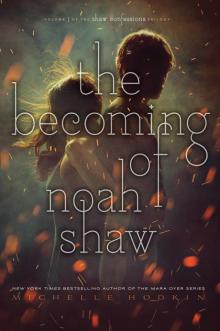 The Becoming of Noah Shaw
The Becoming of Noah Shaw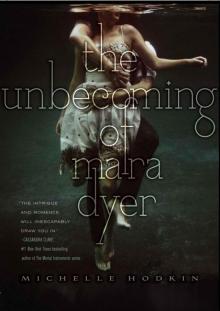 The Unbecoming of Mara Dyer
The Unbecoming of Mara Dyer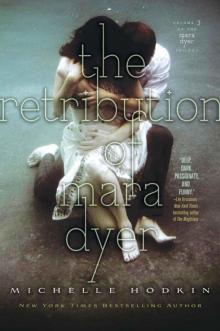 The Retribution of Mara Dyer
The Retribution of Mara Dyer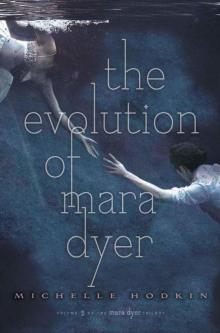 The Evolution of Mara Dyer
The Evolution of Mara Dyer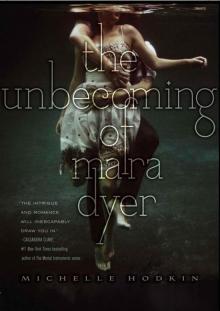 The Unbecoming of Mara Dyer md-1
The Unbecoming of Mara Dyer md-1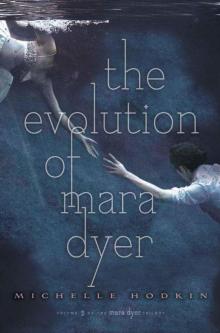 The Evolution of Mara Dyer md-2
The Evolution of Mara Dyer md-2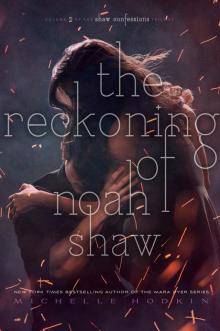 The Reckoning of Noah Shaw
The Reckoning of Noah Shaw